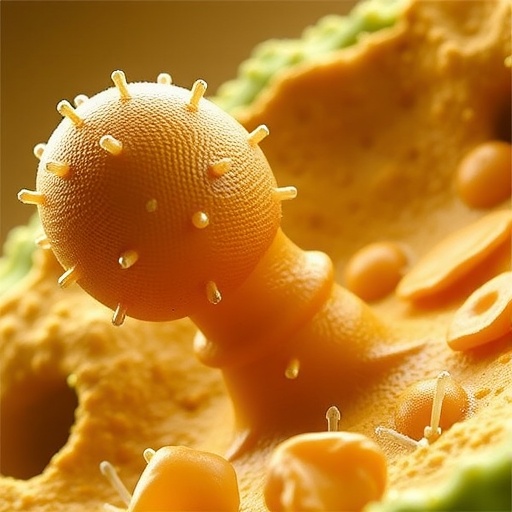In a groundbreaking study published in the prestigious BMC Genomics, researchers led by Wibberg and colleagues have unveiled the complete mitochondrial genomes of the Prototheca genus, marking a significant milestone in comparative genomics and evolutionary insights. The Prototheca genus, a group of achlorophyllous microalgae, has long captivated scientists due to its unique biological characteristics and ecological roles. This research opens new avenues for understanding the evolutionary pathways of marine microorganisms and their adaptability in varying environments.
The study meticulously details the sequencing and analysis of the mitochondrial genomes of multiple Prototheca species, showcasing the advanced methodologies employed in this endeavor. Utilizing cutting-edge sequencing technologies, the team was able to decipher vast amounts of genomic data, which provided unprecedented insights into the evolutionary relationships among these organisms.
One of the standout features of the research is the comprehensive comparative analysis of the mitochondrial genomes. By drawing parallels between the different species within the Prototheca genus and other related organisms, the researchers were able to identify significant genetic variations and similarities. This comparative approach sheds light on the evolutionary dynamics that have shaped the genomic architecture of these microorganisms.
The findings of this research are particularly intriguing when considering the evolutionary implications of mitochondrial genome structures. Mitochondria, often referred to as the powerhouse of the cell, hold crucial information regarding the evolutionary history of eukaryotic life. The researchers found that the Prototheca mitochondrial genomes exhibit unique characteristics that diverge from traditional expectations, emphasizing the need to reassess our understanding of mitochondrial evolution across different life forms.
Furthermore, the study delved into the ecological significance of these organisms. By understanding the genomic intricacies of Prototheca, scientists can better comprehend their roles within aquatic ecosystems and their interactions with other marine life. The ability of Prototheca to thrive in various environments suggests a remarkable adaptability mechanism that warrants further investigation.
Another noteworthy aspect of the research is its contribution to the foundational knowledge in the field of microbial ecology. The genomic insights gained from Prototheca could have far-reaching implications, particularly in biotechnological applications. For instance, the natural properties of these microalgae can be harnessed for various industrial processes, potentially leading to sustainable solutions in biofuels and bioremediation.
The implications of this study extend beyond mere academic curiosity. As scientists face increased environmental challenges, understanding the adaptation mechanisms of microorganisms like Prototheca becomes ever more critical. This research highlights the potential for employing such organisms in biotechnological innovations that address pressing global issues such as climate change and pollution.
Deepening our understanding of the Prototheca genus provides a foundational stepping stone toward unraveling the complexities of marine ecosystems. With the genomic data now available, future studies can focus on elucidating the functional roles of specific genes and their contributions to the overall fitness of these organisms. The ability to manipulate these genetic elements may open doors to new biotechnological applications.
The significance of this research also lies in its interdisciplinary approach, bringing together expertise from genomics, bioinformatics, evolutionary biology, and ecology. This collaborative effort underscores the necessity for integrating various scientific fields to tackle multifaceted research questions in the life sciences.
Moreover, the study emphasizes the importance of biodiversity in scientific research. Examining organisms like Prototheca can reveal critical insights into the broader evolutionary narrative, highlighting the interconnectedness of life on Earth. Understanding such relationships can inform conservation efforts, ensuring the sustainability of both microbial and macroscopic wildlife.
As researchers continue to probe the depths of genomic data, it becomes increasingly clear that the Prototheca genus serves as a critical model for studying microbial evolution and adaptation. The lessons learned from this study could pave the way for future research initiatives aimed at preserving biodiversity and enhancing biological productivity in various ecosystems.
With the publication of this paper, the scientific community is invited to explore the depths of the Prototheca genus and its implications for evolutionary biology and ecology. The dialogue generated by this research serves as an invitation for further exploration, collaboration, and innovation in the quest to understand life at the genetic level.
In conclusion, the comprehensive analysis presented by Wibberg et al. not only enriches our understanding of the Prototheca genus but also sets the stage for future research into microbial genomics and its applications. As the scientific community digests these findings, the potential for groundbreaking advancements in both basic and applied sciences remains limitless.
The unveiling of the complete mitochondrial genomes of the Prototheca genus embodies the spirit of scientific inquiry, emphasizing the importance of understanding our planet’s microbial diversity. As researchers delve deeper into the genetic intricacies of these organisms, they contribute not just to the field of genomics, but also to the broader understanding of life on Earth.
By fostering a holistic understanding of microbial life, this research establishes the groundwork for innovative solutions to some of humanity’s most pressing challenges, bridging the gap between fundamental science and real-world applications.
The future of research on Prototheca stands bright, and the insights gained from this study will undoubtedly inspire a new generation of scientists devoted to exploring the marvels of life’s building blocks.
Subject of Research: Complete mitochondrial genomes of the Prototheca genus.
Article Title: Complete mitochondrial genomes of the Prototheca genus: comparative genomics and evolutionary insights.
Article References:
Wibberg, D., Bakuła, Z., García-Cunchillos, I. et al. Complete mitochondrial genomes of the Prototheca genus: comparative genomics and evolutionary insights.
BMC Genomics 26, 766 (2025). https://doi.org/10.1186/s12864-025-11952-9
Image Credits: AI Generated
DOI:
Keywords: Prototheca, mitochondrial genomes, comparative genomics, evolutionary biology, microbial ecology.




